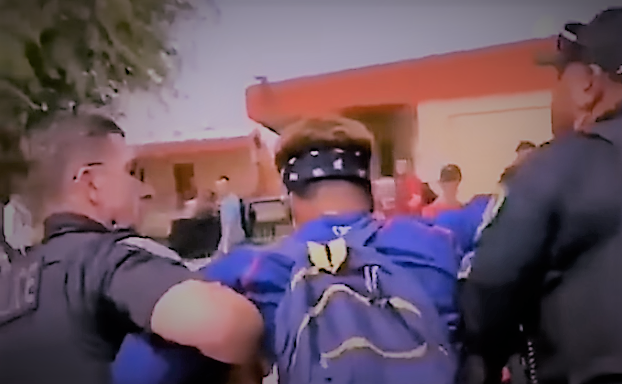
Support justice-driven, accurate and transparent news — make a quick donation to Truthout today!
It’s no secret that our country incarcerates people of color at much higher rates than white people. What might be less well known is that this can begin in the classroom.
Across the country, schools routinely punish, suspend, and expel students of color at higher rates than white students — setbacks that can follow students for years. Those were the findings of a new Institute for Policy Studies report called Students Under Siege.
I saw this firsthand going to school in Indiana. A report by the Indiana Advisory Committee to the U.S. Commission on Civil Rights found that Indiana “ranks second in the country in its rate of black male out-of-school suspensions” and “ranks fourth in the rate of black female out-of-school suspensions.”
It’s not an issue of one group “misbehaving” more than another. An Indiana University study found that black and Latino students are suspended for much more subjective reasons than their white peers. For instance, a white student might be suspended for smoking, while a black, Latino, or Latina student might be suspended for the much murkier offense of being “disruptive.”
I watched the same pattern play out at William Henry Harrison, the West Lafayette, Indiana high school I graduated from in 2015. Despite students of color making up less than a quarter of its student body, they’re overrepresented in suspension rates.
In 2015, 20 percent of black students, 12.3 percent of Latino and Latina students, and 10.5 percent of students identifying with two or more races received in-school suspensions. Numbers were similar for out-of-school suspensions, and rose considerably for students who were expelled: Half were Latino and a quarter were black.
What can schools do to combat these suspensions rates? Portage High School in Northwest Indiana offers an example of the positive effects restorative justice can have on students.
Restorative justice, a government report from neighboring Illinois explains, is “a philosophy based on a set of principles that guide the response to conflict and harm,” influenced by indigenous and religious practices. Instead of punishing students, restorative justice hopes to empower students to fully understand why they act the way they do, and take steps to heal any harms they cause.
Jackson, a Portage student whose story was reported in the Northwest Indiana Times, was deemed a “troublemaker” in middle school. He was written up almost 200 times when he was a seventh grader and expelled the following year. He acted this way, he later said, because he’d just moved from Chicago and didn’t feel like the other students respected him.
At Portage, Jackson was introduced to restorative justice by Sandra Porter-Philips, a social and emotional learning specialist who also manages the school’s Teen Court. He’s participated in the school’s restorative justice circle for the past two years.
The circle has given him an “outlet to relieve my anger” in a healthy way, he said. He’s now passing all his classes and participating in multiple school sports.
Fortunately, interest in restorative justice seems to be growing. The Indiana House recently passed a bill that aims to decrease suspension rates. If the bill passes the state Senate, Indiana’s Department of Education would create an “evidence-based plan” that focuses on “positive discipline strategies and restorative practices.” The plan would go into effect sometime in the next two years.
Restorative justice is moving forward in districts all over the country — from Washington, DC to Oakland, California. And I hope the idea keeps spreading here in Indiana — and maybe even to my old school, Harrison.
A terrifying moment. We appeal for your support.
In the last weeks, we have witnessed an authoritarian assault on communities in Minnesota and across the nation.
The need for truthful, grassroots reporting is urgent at this cataclysmic historical moment. Yet, Trump-aligned billionaires and other allies have taken over many legacy media outlets — the culmination of a decades-long campaign to place control of the narrative into the hands of the political right.
We refuse to let Trump’s blatant propaganda machine go unchecked. Untethered to corporate ownership or advertisers, Truthout remains fearless in our reporting and our determination to use journalism as a tool for justice.
But we need your help just to fund our basic expenses. Over 80 percent of Truthout’s funding comes from small individual donations from our community of readers, and over a third of our total budget is supported by recurring monthly donors.
Truthout’s fundraiser ended last night, and we fell just short of our goal. But your support still matters immensely. Whether you can make a small monthly donation or a larger one-time gift, Truthout only works with your help.